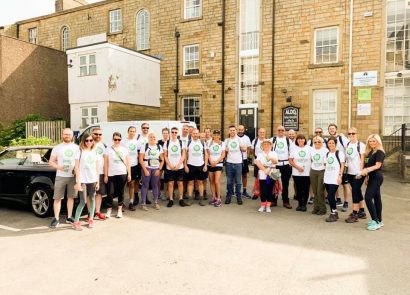As the saying goes, no one knows what goes on behind closed doors, and in our long-term relationships, regardless of whether that’s with a partner, friend, family member or even a colleague, we inevitably encounter highs and lows over the years. However, consistent states of unhappiness and uncertainty are something to pay attention to. According to statistics, it’s estimated that 40 percent of women will experience a form of emotional abuse during their lifetime (Violence and Victims Journal). However, the signs a relationship has turned toxic aren’t always easy to spot and even harder to act upon. So, how can we move forward and get the right support? Our experts are on hand to help.
Spotting the red flags
Nothing in a relationship is ever perfect; whether your partner brings their stress home from work or a friend’s competitive nature has you feeling riled, part and parcel of human connections are allowing room for upset and error. But, as relationship counsellor from Relate (relate.org.uk), Ammanda Major explains, there are warning signs when levels of toxicity spiral out of control: “One of the most obvious signs of a toxic relationship is how you’re feeling about it. If you feel constantly downtrodden or anxious, this is a good indicator, and many people will instinctively know when something isn’t right. Toxic relationships often occur because communication has broken down, and less helpful ways of communication emerge in their stead. Examples of this could be shutting down conversations or telling the rest of the world the other one is to blame for everything. In those relationships, people have developed unhealthy ways of communicating and that’s why counselling can be useful, because it can help people to understand what has happened in their relationship.” Dr Elena Touroni, a consultant psychologist and co-founder of The Chelsea Psychology Clinic, has five ‘red flag signs’ of a toxic relationship.
- Your boundaries aren’t being respected – boundaries are vital in a relationship because they act as guidelines for how you want to be treated. Setting and maintaining boundaries ensures the partnership is both respectful and caring – and that you’re both able to get your needs met.
- You feel like you’ve ‘lost’ yourself – a toxic relationship will drain you of energy. If you’re feeling less and less like yourself, this should be seen as a red flag.
- You feel as though you can’t exist without each other – this is a warning sign of codependency. For a healthy relationship, it’s important for partners to have a life outside of the couple dynamic.
- You’ve lost touch with friends and family – maybe they complain about how much time you spend talking to your brother on the phone, or they refuse to hang out with your friends. A controlling partner will attempt to isolate you from the people close to you to make you more reliant on them.
- The relationship is physically or emotionally abusive – if there has been any physical violence, it’s imperative you leave as soon as possible. Emotional abuse (shouting, swearing, name-calling, manipulation etc) can be equally damaging – leaving invisible psychological and emotional scars long after the relationship has ended.
Controlling behaviours
Toxic relationships can range from criticising statements to chronic mistrust, but sometimes the thread of toxicity can be far more subtle. “Coercive control is a behaviour we often see in these types of relationships and it is very undermining,” says Ammanda. “It is essentially one partner seeking to dominate and control the other. It is sometimes accompanied by physical violence. A controller might control what their partner says, what they wear, they might alienate them from their friends and family or they might insist on taking them to and from work or controlling the household finances.” Sometimes the control is even more subtle; it could be consistently undermining a partner and humiliating them in front of friends and family. “For the victim, this becomes their norm and so they feel incapable of getting it ‘right’ for the person who is controlling them. It’s a very complex interaction, but the responsibility of control lies with the controller. Those behaviours are one-way.”
Cultivating awareness
Of course, some relationships can be even more complex than our most intimate partnerships. Rifts between family members and friends are less commonly acknowledged as being toxic but can be just as impactful. “Family feuds can be complex and often have roots in several potential areas,” explains Ammanda. “Sometimes that’s because basic disagreements get out of hand, but sometimes it’s about family scripts, with some family groups wanting to do things differently and go against the norm. Again, that’s where family counselling or therapy would be very useful. For most people, losing family connections can feel very profound and if you’re not fitting in as they wish you to do, that can also feel very pressurising.”
Toxicity within a relationship arises for many reasons, even in our closest platonic bonds. And while there isn’t any reason you shouldn’t seek therapy if you and the friend or family member would like to, addressing rifts quickly and being self-aware can be equally effective. “Try to address things as soon as you notice something is wrong,” says Ammanda. “Often the longer things go on, the more they become habitual and this causes more resentment. Staying aware of your own feelings and being mindful of checking in with your relationships is an important skill to learn.”
How to reach out
Feel like your relationship could do with some TLC? Here at the best options if you want to seek outside help
Couple counselling
“Sometimes counselling as a couple is very beneficial,” explains Ammanda. “You can understand what has happened in a relationship, why it’s happened and how you want to move on, whether that’s together or separately. So, for some relationships, couple counselling is immensely helpful. It helps people work on things from the past, think about how they would like their relationship to be, and find more effective ways of communicating.”
Individual support
“If you’re experiencing coercive control, couple counselling is a less helpful thing to do. Think about what you may need to do to protect your own emotional welfare and physical safety.
“It can also be helpful to seek out individual support to talk through how you’re feeling. “Depending on the circumstances and situation, it can be a good idea to introduce a partner into that work later on,” says Ammanda.
Speaking to a professional
There may come a time when you need more than the support of family and friends. “Just having a conversation with someone who is completely outside of your relationship, whether that’s a helpline worker or anyone in a professional capacity, can help you to focus on what isn’t feeling right,” says Ammanda. “Sometimes people prefer to talk with a good friend or family member, but the key thing is that you’re reaching out.”
Helplines:
Relate
0300 0030396
relate.org.uk
Women’s Aid
helpline@womensaid.org.uk
womensaid.org.uk
National Domestic Abuse
Helpline
0808 2000 247
nationaldahelpline.org.uk



















